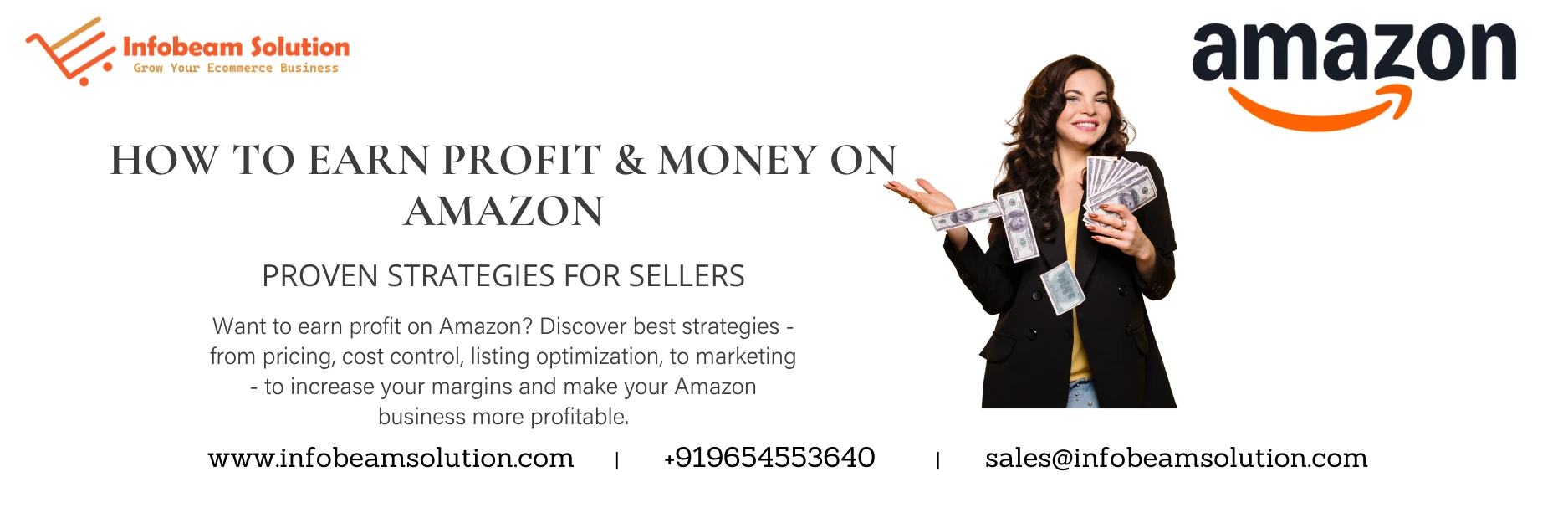How to Earn Profit & Money on Amazon – Proven Strategies for Sellers
Selling on Amazon can be highly profitable, but only if you take the right steps. With millions of competitors, rising costs, and changing algorithms, a smart strategy is essential. This guide reveals the most effective ways to earn profit on Amazon, reduce costs, and grow your business sustainably.

Table of contents
- How to Earn Profit & Money on Amazon – Proven Strategies for Sellers
- 1. Know Your Costs Clearly
- 2. Choose High-Margin Products
- 3. Optimize Your Product Listing
- 4. Price Strategically & Reprice Regularly
- 5. Reduce Operational Costs
- 6. Drive More Sales Through Marketing & Visibility
- 7. Leverage Fulfillment Options Wisely
- 8. Monitor Metrics & Adjust Based on Data
- 9. Avoid Common Mistakes That Eat Into Profit
- Final Thoughts
- Related Posts
1. Know Your Costs Clearly
You can’t manage profits unless you understand all your costs. Include:
- Cost of goods (purchase or manufacturing)
- Shipping costs to Amazon or to customers
- Amazon fees: referral fees, fulfillment fees, storage fees, any subscription fees
- Advertising and promotional costs (PPC, coupons, etc.)
- Returns, refunds, and damage costs
Calculate a break-even price for each product, this is the baseline below which you lose money.
2. Choose High-Margin Products
- Focus on niches with less competition so you don’t have to undercut heavily.
- Products that are lightweight and small may save you on shipping and storage.
- Sell bundles or kits, selling three smaller items together can increase average order value and perceived value.
- Private label or customize generic products to distinguish and charge premium pricing.
3. Optimize Your Product Listing
- Include strong keywords in title, bullets, description, and backend search terms so your product shows up for relevant searches.
- Use high-quality images and infographics showcasing benefits and uses.
- Highlight differentiators, why your product is better (e.g. warranty, features, quality).
- Use plenty of customer-friendly content like FAQs to reduce pre-purchase doubts.
4. Price Strategically & Reprice Regularly
- Use pricing tools that monitor competitors and adjust your pricing dynamically.
- Avoid being the lowest price always if margins suffer, sometimes slightly higher price with better reviews or shipping wins Buy Box and improves profit.
- Offer discounts or coupons smartly during promotional periods, but ensure the discount cost is justified by extra sales.
5. Reduce Operational Costs
- Keep packaging light and compact to minimize shipping and storage fees.
- Use “just-in-time” inventory planning to avoid overstocking and paying storage fees.
- Choose fulfillment options wisely (e.g. FBA vs fulfilling yourself) based on where they make financial sense.
- Automate processes where possible (order management, returns, customer communications) to reduce labor cost.
6. Drive More Sales Through Marketing & Visibility
- Use Amazon PPC (Sponsored Products & Brands) to increase visibility for new products or keywords.
- Leverage coupons, deals, lightning deals during high traffic times.
- Encourage reviews from happy customers (within Amazon’s policies) to build trust and social proof.
- Use A+ Content or Enhanced Brand Content if available to improve conversion rates.
7. Leverage Fulfillment Options Wisely
- Fulfillment by Amazon (FBA) can increase trust and shipping speed, but comes with storage and fulfillment fees. Use FBA where its benefits (buy box, Prime) outweigh the cost.
- Self-fulfillment (Seller Fulfilled) gives more control, use it for low weight, low storage cost items.
- Hybrid approach: some items via FBA, some self-fulfilled to balance cost and service.
8. Monitor Metrics & Adjust Based on Data
- Keep a close eye on metrics that affect profitability: conversion rate, click-through rate (CTR), return rate, defect rate, late shipment rate.
- Use Amazon’s business reports, advertising reports, search term reports to see what keywords and ads are working.
- A/B test listings, images, pricing, promotions to see what attracts more buyers.
9. Avoid Common Mistakes That Eat Into Profit
| Mistake | How It Hurts You |
|---|---|
| Underestimating fees and hidden costs | You price too low and cut into margin |
| Ignoring negative reviews or returns | Leads to higher overall return costs or loss of reputation |
| Poor inventory planning | Storage fees or stockouts both cost you money |
| Over-reliance on discounts | Constant low price strategy devalues brand and reduces perception of value |
| Not investing in listing or content improvements | Lower conversion means you need more traffic to make the same sales |
Final Thoughts
You can absolutely make good profit on Amazon, but it requires a smart mix of cost control, listing optimization, pricing strategy, fulfillment decisions, marketing, and constant monitoring. Start by knowing your true costs, choose products that give good margins, optimize your listings and pricing, and leverage visibility tactics smartly.